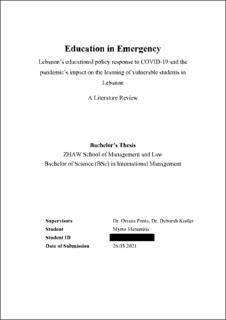Please use this identifier to cite or link to this item:
https://doi.org/10.21256/zhaw-24370Full metadata record
| DC Field | Value | Language |
|---|---|---|
| dc.contributor.advisor | Ponta, Oriana | - |
| dc.contributor.advisor | Kistler, Deborah | - |
| dc.contributor.author | Merentitis, Myrto | - |
| dc.date.accessioned | 2022-03-02T09:23:01Z | - |
| dc.date.available | 2022-03-02T09:23:01Z | - |
| dc.date.issued | 2021 | - |
| dc.identifier.uri | https://digitalcollection.zhaw.ch/handle/11475/24370 | - |
| dc.description.abstract | 1.5 million Syrians and nearly half a million Palestinian refugees are estimated to live in Lebanon. This number makes it the country with the highest number of refugees relative to its population. More than half of the refugees who live in Lebanon are children, and providing education to these additional students bears an enormous challenge to Lebanon’s public sector. As a result, many refugee children do not have access to education. Before the COVID-19 pandemic, Lebanon has been facing an economic and political crisis. Then, the pandemic forced Lebanon into a lockdown, including school closures which disrupted the education of 1.3 million students in Lebanon. The thesis summarizes Lebanon’s educational policy response to the pandemic focusing on primary and lower secondary levels. Then, the pandemic’s impact on children’s learning outcomes was analyzed focusing on refugee students. Lastly, the paper provides tools to measure social and emotional learning in a low-resource setting, such as in Lebanon. The thesis is based on a literature review. The theoretical framework analyzed Lebanon’s existing education policies and built the base for the findings. The pandemic’s impact on children’s learning was evaluated by monitoring how school closures have affected learning in the past. Then, hypotheses will be drawn on the education of refugee children in Lebanon. Lebanon’s Ministry of Education responded to the pandemic with remote learning in the form of television, online learning, and paper-based methods. A digital platform has been launched with online classes. However, barriers such as a lack of internet and electronic devices hinder many vulnerable children from accessing online learning tools. The research on past school closures showed that a significant learning loss due to the pandemic is expected. The scope of the learning loss depends on the mitigation strategies and if they are made available for all students. Furthermore, the pandemic is connected with harmful side effects, such as economic shocks of households and social distancing that further decrease the well-being and development of children. Lastly, libraries and measurement tools were found that have been developed to evaluate social and emotional learning programs in crisis settings. The thesis concludes that the COVID-19 pandemic will increase Lebanon’s educational inequalities as refugee and vulnerable children are less likely to access remote learning options. In 2020, the number of Syrian refugees that live in extreme poverty has increased by more than 30%. Moreover, past research indicates that vulnerable children are at a high risk of not returning to school. Lebanon’s government must ensure a resilient and inclusive post-COVID education system supported by transparent policy reforms. Lastly, further research is needed to fully evaluate the pandemic’s impact on children’s learning outcomes. | de_CH |
| dc.format.extent | 55 | de_CH |
| dc.language.iso | en | de_CH |
| dc.publisher | ZHAW Zürcher Hochschule für Angewandte Wissenschaften | de_CH |
| dc.rights | https://creativecommons.org/licenses/by-nc-nd/4.0/ | de_CH |
| dc.subject.ddc | 371: Schulen und schulische Tätigkeiten | de_CH |
| dc.title | Education in emergency : Lebanon’s educational policy response to COVID-19 and the pandemic’s impact on the learning of vulnerable students in Lebanon – a literature review | de_CH |
| dc.type | Thesis: Bachelor | de_CH |
| dcterms.type | Text | de_CH |
| zhaw.departement | School of Management and Law | de_CH |
| zhaw.publisher.place | Winterthur | de_CH |
| dc.identifier.doi | 10.21256/zhaw-24370 | - |
| zhaw.originated.zhaw | Yes | de_CH |
| Appears in collections: | BSc International Management | |
Files in This Item:
| File | Description | Size | Format | |
|---|---|---|---|---|
| Bachelor Thesis_Myrto Merentitis_26.03.21.pdf | 1.3 MB | Adobe PDF |  View/Open |
Show simple item record
Merentitis, M. (2021). Education in emergency : Lebanon’s educational policy response to COVID-19 and the pandemic’s impact on the learning of vulnerable students in Lebanon – a literature review [Bachelor’s thesis, ZHAW Zürcher Hochschule für Angewandte Wissenschaften]. https://doi.org/10.21256/zhaw-24370
Merentitis, M. (2021) Education in emergency : Lebanon’s educational policy response to COVID-19 and the pandemic’s impact on the learning of vulnerable students in Lebanon – a literature review. Bachelor’s thesis. ZHAW Zürcher Hochschule für Angewandte Wissenschaften. Available at: https://doi.org/10.21256/zhaw-24370.
M. Merentitis, “Education in emergency : Lebanon’s educational policy response to COVID-19 and the pandemic’s impact on the learning of vulnerable students in Lebanon – a literature review,” Bachelor’s thesis, ZHAW Zürcher Hochschule für Angewandte Wissenschaften, Winterthur, 2021. doi: 10.21256/zhaw-24370.
MERENTITIS, Myrto, 2021. Education in emergency : Lebanon’s educational policy response to COVID-19 and the pandemic’s impact on the learning of vulnerable students in Lebanon – a literature review. Bachelor’s thesis. Winterthur: ZHAW Zürcher Hochschule für Angewandte Wissenschaften
Merentitis, Myrto. 2021. “Education in Emergency : Lebanon’s Educational Policy Response to COVID-19 and the Pandemic’s Impact on the Learning of Vulnerable Students in Lebanon – a Literature Review.” Bachelor’s thesis, Winterthur: ZHAW Zürcher Hochschule für Angewandte Wissenschaften. https://doi.org/10.21256/zhaw-24370.
Merentitis, Myrto. Education in Emergency : Lebanon’s Educational Policy Response to COVID-19 and the Pandemic’s Impact on the Learning of Vulnerable Students in Lebanon – a Literature Review. ZHAW Zürcher Hochschule für Angewandte Wissenschaften, 2021, https://doi.org/10.21256/zhaw-24370.
Items in DSpace are protected by copyright, with all rights reserved, unless otherwise indicated.